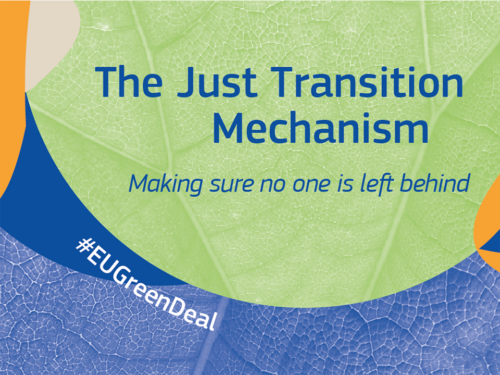Objectives and goals of the funding programme
The activities supported by JTF include:
- Investments in firms;
- Research and innovation;
- Clean energy technologies;
- Greenhouse gas emission reduction;
- Digitalisation;
- Regeneration of sites;
- Circular economy;
- Upskilling and reskilling workers;
- Assistance to job seekers;
- Technical assistance.
The allocation method ensures that while all EU countries can access funding, resources go to regions facing the biggest challenges. EU countries are thus preparing their Territorial Just Transition Plans (TJTPs) identifying eligible territories expected to be the most negatively impacted by the green transition. These TJTPs are annexed to the programmes entailing JTF support and adopted together.
The Just Transition Fund is co-managed and accessible through the competent authorities in charge of the programmes.
The Commission has set up a Just Transition platform to assist EU countries and regions in finding support available through the Just Transition Mechanism.
Type of Programme
Just Transition Fund (JTF)
Funding type/type of support
Financing (Loans/Guarantees)
Organizational level
International
Programme Focus
Competitiveness, research and innovation, Skills
Programme relevant for/ target group
Academic institution, Natural persons (private individuals), SMEs and micro companies, VET Providers, Other
Geographic area
European Union
It provides targeted support to help mobilise around €55 billion over the period 2021-2027: €19.2 billion in current prices, is expected to mobilise around EUR €25.4 billion in investments.
People and citizens, most vulnerable to the transition.
The Just Transition Mechanism will protect them by:
• Facilitating employment opportunities in new sectors and those in transition;
• Offering re-skilling opportunities;
• Improving energy-efficient housing;
• Investing to fight energy poverty;
• Facilitating access to clean, affordable and secure energy.
Companies and sectors, active in or comprising carbon-intensive industries.
The Just Transition Mechanism will protect them by:
• Supporting the transition to low-carbon technologies and economic diversification; based on climate-resilient investments and jobs;
• Creating attractive conditions for public and private investors;
• Providing easier access to loans and financial support;
• Investing in the creation of new firms, smes and start-ups;
• Investing in research and innovation activities.
Member States and regions, with high dependence on fossil fuel and carbon-intensive industries.
The Just Transition Mechanism will protect them by:
• Supporting the transition to low-carbon and climate-resilient activities;
• Creating new jobs in the green economy;
• Investing in public and sustainable transport;
• Providing technical assistance;
• Investing in renewable energy sources;
• Improving digital connectivity;
• Providing affordable loans to local public authorities;
• Improving energy infrastructure, district heating and transportation networks.
To be eligible for JTF funding, investments in the following activities and themes must be supported:
- Retraining of workers and inclusion of jobseekers;
- SMEs and the creation of new businesses that diversify the economy of a territory;
- Renewable energies and energy efficiency of buildings;
- Renovation and modernisation of district heating networks;
- Clean mobility;
- Digital technology;
- Circular economy, including waste management.
The scope of support includes, inter alia:
- Investments in microenterprises;
- Sustainable tourism, sustainable transport;
- Digital innovation;
- Training workers and jobseekers.
All investments contribute to the achievement of the objectives detailed in the Territorial Just Transition Plans (TJTPs). In addition, the supported activities focus on internal economic growth in key sectors in relation to the affected smart specialisation strategies.
The Just Transition Fund aims to reduce the social and economic costs resulting from the transition to an EU climate-neutral economy by supporting a diversification of economic activity, creating new business opportunities and helping people adapt in a changing labour market. To tourism SMEs, the fund can provide investments in fixed capital or immaterial assets.
Not yet available.
